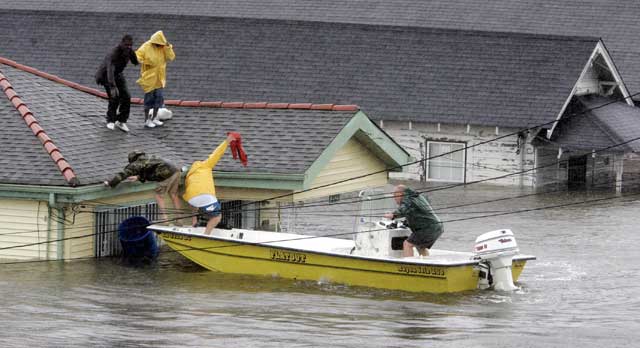Zeitoun, By Dave Eggers
A story of hope from a deluge of despair

Your support helps us to tell the story
From reproductive rights to climate change to Big Tech, The Independent is on the ground when the story is developing. Whether it's investigating the financials of Elon Musk's pro-Trump PAC or producing our latest documentary, 'The A Word', which shines a light on the American women fighting for reproductive rights, we know how important it is to parse out the facts from the messaging.
At such a critical moment in US history, we need reporters on the ground. Your donation allows us to keep sending journalists to speak to both sides of the story.
The Independent is trusted by Americans across the entire political spectrum. And unlike many other quality news outlets, we choose not to lock Americans out of our reporting and analysis with paywalls. We believe quality journalism should be available to everyone, paid for by those who can afford it.
Your support makes all the difference.Abdulrahman Zeitoun was born in Jebleh, on Syria's Mediterranean coast. Decades later and thousand of miles away, he awakes from dreaming of a fishing expedition out of his childhood home: "Beside him he could hear his wife Kathy breathing, her exhalations not unlike the shushing of water against the hull of a wooden boat." As so often in Dave Eggers's latest novel, the docu-drama Zeitoun, a caught image opens a window on an ocean of memory and a state of mind.
Zeitoun now lives in New Orleans, where he runs a painting and building company and owns several buildings. He's a dedicated businessman, father, husband, and Muslim. His painter's van is emblazoned with a rainbow, which Zeitoun soon discovers has gay associations for Americans. But he doesn't change it. "Anyone who had a problem with rainbows, he said, would surely have trouble with Islam."
Kathy, practical and strong-willed, was brought up a Baptist in Baton Rouge. Attracted by "the doubt sown into the faith" and "the sense of dignity embodied by the Muslim women she knew," she converted to Islam after her failed first marriage. Some years later she married the much older Zeitoun.
Eggers describes their domestic bustle and warmth, and their irritations. For Zeitoun, these include his children's wastefulness and obsession with pop music, and his alienation in a family of women. Kathy is bothered by Zeitoun's stubbornness and her own family's Islamophobic nagging.
As Hurricane Katrina barrels towards New Orleans, Kathy drives her daughters to her family in Baton Rouge, then escapes to friends in Arizona. Zeitoun stays at home, first to look after his property and tenants, then because he feels he's needed. His silent canoe is more effective than the armed motor boats whose noise drowns out calls for help. He rescues elderly residents from their attics and feeds abandoned puppies. The authorities, on the other hand, shoot puppies – prompting Zeitoun to wonder if something "had changed irrevocably. That this was considered a sane or even human option signalled that all reason had left this place."
Eggers uses Zeitoun's eyes to report on America's reasonless post-Katrina world, offering a counterpoint to media portraits of "third world" chaos (there were many poor black victims). On the community level, there is kindness, common sense and solidarity. Neighbours and strangers of all ages and ethnicities pull together. As far as Zeitoun can see, unreason comes from the state.
Zeitoun is on the porch of his own building when he is apprehended by armed men. He is locked up for 23 hours a day and given (religiously forbidden) pork to eat. He meets people arrested for carrying their own property, or for complaining. The state's "guilty until proven innocent" attitude is particularly dangerous for the Arab-Muslim Zeitoun. "You're al-Qa'ida," he is told, presumably because the Syrian friend arrested with him is carrying a bag of cash (Middle Easterners rarely trust banks). Zeitoun is transferred to Elayn Hunt Correctional Centre and into a Guantánamo-style orange jumpsuit. For a month he is refused a phone call. Kathy assumes her husband is dead.
Bush-era America's response to Katrina mirrors the failures of the Iraq occupation. There is the same reliance on big but useless technology; sensationalist media coverage and tooled-up security are both overdone, while rescue and reconstruction work are hardly done at all.
Mercenaries, and the Israeli organisation Instinctive Shooting International, prowl the flooded streets. The first prison Zeitoun experiences was built, almost overnight, at the city bus station – a great organised effort – while stranded citizens died of thirst. Following Abdulrahman's release, a trailer home is provided to the Zeitouns (whose home is terribly damaged), but the trailer's key never turns up.
Back to Jebleh. After two days clinging to a barrel on a stormy sea, Zeitoun's father ordered his children to spend their lives on land. But Zeitoun is drawn to water, working as a fisherman and sailor, exploring the continents. His older brother becomes a world-champion ocean swimmer. Throughout the novel water represents freedom and borderless space, contrasting with Zeitoun's American confinement.
Reminiscent of Gabriel García Márquez's documentaries, this is a true story told with the skills of a master of fiction. It's an immensely readable account of ordinary people struggling through extraordinary circumstances, as well as a commentary on the strains put on a genuinely multi-cultural society by corporatised welfare and militarised nationalism. A political text or straight journalism would not have brought out the human dimension, but here are fantasies, fears, verbal tics, textured relationships and subtle timbres of mood. This could only be achieved by the holistic novel form.
Robin Yassin-Kassab is the author of 'The Road from Damascus' (Penguin)
Join our commenting forum
Join thought-provoking conversations, follow other Independent readers and see their replies
Comments